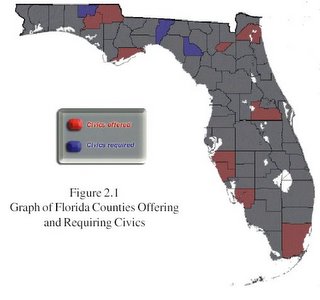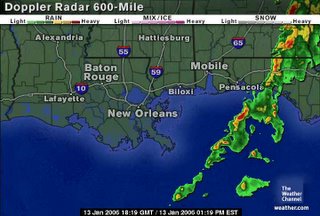"...almost all the truly important utilitarian and scientific achievements of our space program have been made by instrumented, unmanned spacecraft controlled remotely by radio command from stations on the earth."
Yesterday's
successful launch of New Horizons, the Pluto probe, brings to mind the wisdom of one of America's greatest space pioneers, physicist James A. Van Allen of the University of Iowa.
Twenty years ago, or nearly twice as long as it will take New Horizons to reach Pluto, Prof. Van Allen was moved by the Challenger disaster to publish a succinct, level headed, and, to many minds, persuasive argument for re-tooling the U.S. space program to emphasize
un-manned exploration. Since then, we have seen many remarkable triumphs of
unmanned scientific space missions. Among them, most recently, have been the astounding persistence of
the Mars Rovers, the pin-point accuracy of
Deep Impact, and the return from deep space two days ago of
Stardust.
These are merely the best known among dozens of other scientific space probes which are teaching us the details about our own planet, its atmosphere, the Sun, Moon, Mercury, Venus, Saturn, large asteroids, and much more. Meanwhile, manned flight experiments have been confined largely to keeping a handful of astronauts alive as we use aged Russian rockets to shuttle them back and forth to the low-orbit International Space Station, at a cost of more than
$100 billion.
It's time once again to be reminded of old wisdom. Prof. Van Allen's article is as timely today as it was when it was written, but it has not been readily accessible on the web. So, one week before the 20th commemoration of the
Challenger disaster, we are reprinting it from a private manuscript draft he shared with friends two decades ago.
-----------------------
Myths and Realities of Space Flight
By
James A. Van Allen**(Reprinted from an essay written in 1986. No copyright claimed)
One of the many distressing and ironic aspects of the tragic loss of life in the explosion- during-launch of the space shuttle Challenger on 28 January [1986] is the fact that the principal purpose of its mission was the orbital delivery of a communications satellite. This function has been performed successfully and much less expensively for many years, with minimal risk to human life, by unmanned launch vehicles.
A presidentially appointed commission is engaged in a detailed investigation of the technical causes of this disaster and the relevant administrative procedures of the National Aeronautics and Space Administration. More importantly, the present disarray of our national space program demand a rethinking of its basic structure, and this is an appropriate juncture for doing so.
The Mythology of Space Flight
In 160 A.D., many centuries before the time of Isaac Newton, the Greek satirist Lucian of Samosata wrote an account of how Ulysses' ship had been caught up in a whirlwind and carried on a 7-day flight to the moon (1). In the early 17th century this work was translated from Greek into Latin by Johannes Kepler, the great early astronomer, in order to make it more widely available. Soon thereafter, Kepler himself wrote a fantasy of space flight called Somnium. In a 1629 letter to a friend he wrote, "If in the end we be driven from the earth, my book will serve as a useful guide for the emigrants and pilgrims who will be settling on the moon . . .'
[1]. But Kepler was careful to make clear the speculative nature of his "dream.'
During the subsequent three centuries, many other authors wrote fictional accounts of voyages from the earth to the moon and of visits to the earth by extraterrestrial creatures from the star Sirius and from the planet Mars. Fictional space flight is a booming component of the entertainment industry at present and, for the most part, no attention whatever is given to either physical principles or practicality. Nonetheless, the mythology of space is a significant element of our culture.
Closely akin to science fiction and a prominent part of the 1986 scene is the large number of futuristic proposals for space flight. I may mention a few by short title: solar power satellites; manufacturing in space; permanently manned space stations in earth orbit, on the moon, and on Mars; and the economic mining of asteroids.
It is difficult to distinguish the proposals of prophets from those of charlantans, and I am not so foolish as to suggest that such undertakings are out of the question at some remote time in the future. But not one of them can withstand critical scrutiny in the context of the present century. I consider that untimely advocacy of them, especially by prominent national figures, does the entire space effort a disservice.
In science fiction, "space flight' means manned space flight -- that is, the flight of humans or other living creatures having at least some human characteristics. This is also the popular perception of what real space flight is mostly about.
The Realities of Space
With such a perception, many space enthusiasts blithely ignore the fact that almost all the truly important utilitarian and scientific achievements of our space program have been made by instrumented, unmanned spacecraft controlled remotely by radio command from stations on the earth. Our great system of rapid worldwide communications by means of satellite transponders in orbit around the earth is only one of many examples of this. Other examples are in weather forecasting; remote sensing of the earth's surface resources; marine and aircraft navigation; the science of the sun and of the earth's ionosphere, magnetosphere, atmosphere, and oceans; and military reconniassance, surveillance, and other applications of space technology that are technically similar to those for civil purposes.
In the realm of basic science, space techniques have brought spectacular advances in astronomy and in detailed knowledge of the sun and the other elements of the solar system. And there is no end in sight.
Since 1962 the United States and the Soviet Union have carried out massive and sophisticated programs of close-up investigations of six of the other eight major planets of the solar system -- Mercury, Venus, Mars, Jupiter, Saturn, and Uranus--as well as scrutiny of the many satellites of Mars, Jupiter, Saturn, and Uranus and the rings of the latter three.
Lunar, planetary, and cometary investigations have included close flybys, orbiters, and both hard and soft landers. Samples of lunar surface material have been brought back to the earth for laboratory study by our Apollo spacecraft and by unmanned, commandable spacecraft of the Soviet Union. The Soviet technique is applicable to the return of samples of material from Mercury, Mars, asteroids, natural satellites of planets, and cometary nuclei.
A huge increase in our detailed knowledge of the origin and evolution of our solar system and of its physical and chemical workings has been achieved. I think it fair to claim that the past 24 years of solar system investigation have constituted one of the most important epochs of human history. Each planet and each satellite is a new world of marvelous and distinctive properties and phenomena. Each is worthy of much more detailed scientific study, as are the geophysics and geochemistry of the earth.
Within a broad humanistic context the most important products of this work, as with the entire field of astronomy, are of a general intellectual nature -- namely the enhancement of our understanding of mankind's place in our great universe.
Here I may quote a comment by William Fowler, one of the two 1983 Nobel laureates in physics, concerning his studies of the sources of the sun's energy output on which all life depends
[2]:
"What we're doing is mainly a cultural and intellectual contribution to the sum total of human knowledge and that's why we do it. If there turn out to be potential applications, that's fine and dandy, but we think that it's important for the human race to know where sunlight comes from."
Among other aspects of the body of evidence that we have found is the realization that the earth harbors the only living organisms within the solar system. This finding is not yet wholly conclusive, but there is progressively less basis for doubting it.
A complementary realization is that the ecology of the earth is a fragile one and that the earth, too, may become unsuitable for human habitation at some future time because of a combination of natural and man-made causes. Such a possibility is illuminated by studies of Venus, often called the earth's sister planter because of its similar size, mass, and distance from the sun. The surface of Venus is hotter than the melting temperature of lead, and its dense atmosphere consists of carbon dioxide, nitrogen, carbon monoxide, sulfur dioxide, and other gases deadly to any known form of life.
I am not forecasting the near-term extinction of life on earth, but I am noting that comparative studies of the planets are already providing guidance for the wise conduct of human activities.
Despite the great successes and future promise of automated, commandable, unmanned spacecraft in providing vital human services and scientific advances, the President and Congress persist in giving primary emphasis to the misty-eyed concept that the manifest destiny of mankind is to live and work in space. The proposed development of a system of permanently manned space stations serves this concept but is otherwise poorly founded. If such a development is pursued as directed by the President two years ago, many of the much more worthy undertakings in space will languish for lack of support.
My own view is that our national predicament is the result of the clash between the mythology of manned space flight and the real achievements of space technology in practical applications to human welfare and the expansion of human knowledge.
Fervent advocates of the view that it is mankind's manifest destiny to populate space inflict a plethora of false analogies on anyone who contests this belief. At the mere mention of the name of Christopher Columbus they expect the opposition to wither and slink away. I find it possible to resist such an expectation. If reference to Columbus is made in an offhand, thoughtless way, it is merely incompetent; but if made with full knowledge of the facts, it is deceitful and fraudulent.
Let me explain. Our instrumented spacecraft have now ranged over the entire solar system. As an example, the surface of Mars has been studied comprehensively by a succession of U.S. and Soviet spacecraft, most notably the two Viking orbiter and soft-lander missions. If a similar survey of America had been available in the late 15th century, the mission of Columbus' fleet to the West Indies would have been unequivocally desirable.
But the application of the Columbus analogy to support advocacy of a manned mission to Mars is massively deceitful. Mars is not terra incognita. We have already explored it and found it to be far more desolate and sterile than the heart of the Sahara desert. There, of course, remain many matters of deep scientific interest on Mars but these matters can be addressed systematically--at much less cost and without risk to human life--by automated, commandable spacecraft, surface rovers, and sample return-to-earth missions.
It is difficult to avoid mentioning the poignant juxtaposition of the Challenger disaster and the brilliantly successful encounter of the scientific spacecraft Voyager 2 with the planet Uranus during the same week of late January. Voyager 2 was launched by a Titan Centaur on 20 August 1977 and proceeded outward to extremely fruitful flybys of Jupiter (July 1979) and Saturn (August 1981). Its close encounter with Uranus yielded the discovery of its magnetic field and radiation belts (previously totally unknown) and marked advances in knowledge of its atmosphere, its energy balance, and its extensive system of satellites and rings. During the close encounter, fresh discoveries were pouring out of the investigators' workrooms at a dizzying pace.
Anyone who thinks that unmanned spacecraft are dull or void of intensive human participation should have been present at the Jet Propulsion Laboratory in late January.
In the arena of national space policy, I am deeply distressed by the dissipation and misdirection of our immense technical and human resources on enterprises that appeal to persons of a science fiction mind-set but are otherwise ill-considered and fruitless.
I conclude by proposing the following measures for the optimal exploitation of the great potential of space during the years immediately ahead.
- Suspend manned flight indefinitely pending critical assessment of its justification.
- Postpone development of the space station.
- Resume the production of previously well-developed expendable launch vehicles
- such as Scout, Delta, Atlas, Centaur, and Titan and upgrade their performances
- progressively.
- Seek lower cost launching techniques.
- Emphasize advanced applicational and scientific work.
- Recast the structure and the public image of NASA to those of an agency whose
- primary purposes are to develop space applications of widespread human
- importance and make major advances in human understanding of the great
- universe within which we are privileged to live.
REFERENCES
1. McGraw-Hill Encyclopedia of Space (McGraw-Hill, New York, 1967), p. 16.
2. W. Fowler, interview quoted in Caltech Bull. (1984).
----------
This article is reprinted from a 1986 draft manuscript provided personally by the author. It was later published in the journal,
Science. Another version also appeared in
Scientific American.
**
James A. Van Allen was the recipient of the 2004 National Space Grant Distinguished Service Award by the National Space Grant Foundation. The award recognizes individuals who have shown exceptional dedication in their efforts to support and promote aerospace technology, science and education, consistent with the goals of the National Space Grant College and Fellowship Program. Van Allen played an important role in planning the 1958 launch of Explorer 1 -- the first successful U.S. satellite -- and its scientific payload, which provided information that the Earth is surrounded by regions of intense radiation, later called the "Van Allen radiation belts." The discovery marked the birth of the research field of magnetospheric physics.
He also was the recipient of countless prestigious awards for scientific achievement, including the Gerard P. Kuiper Prize (1994), the NASA Lifetime Achievement Award (1994), the National Medal of Science, the nation's highest honor for scientific achievement (1987), and the Crafoord Prize (1989), awarded by the Royal Swedish Academy of Sciences in Stockholm and presented by the King of Sweden. The Crafoord Prize is the highest award the Academy can bestow for research in a number of scientific fields and, for space exploration, is the equivalent of the Nobel Prize.
 Today's St. Petersburg Times includes a report by Joni James that "In his last year as Florida's elected insurance commissioner, Tom Gallagher invested millions of dollars in insurance-related stocks... ." The information comes from Gallagher's 2002 tax returns.
Today's St. Petersburg Times includes a report by Joni James that "In his last year as Florida's elected insurance commissioner, Tom Gallagher invested millions of dollars in insurance-related stocks... ." The information comes from Gallagher's 2002 tax returns.


















